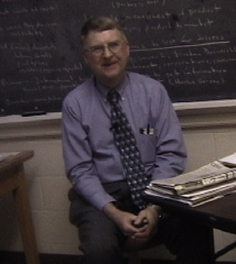Ed March:
Professor Hopes to Sustain Students
By Danielle Paras
|
SUSTAINABILITY.
Surely, a word that college students have been taught to understand. So then what does it mean? Dr. Ed March of the Engineering Department here on campus tells us that "In theory, the dictionary definition of sustainable development addresses the economic, environmental and social development aspects of an enterprise's activities." To him, it means that a company should seek to be prosperous while maintaining environmentally responsible processes and products. This, in turn, leads to social development which provides the community with more employment opportunities, better training, and safer working conditions so that hazards to employee health and safety are minimized. His face lights up conspiratorially and then he drops the (metaphorical) bomb: UMass Lowell has played an integral role in the development of sustainability throughout the Merrimack Valley since the very beginning. Not convinced? Perhaps that could be because the University's mission of sustainability has taken a backseat to MLA guidelines, Plato's Republic, and Copernicus. Perhaps sustainability is regulated only to North campus students: the engineers, the scientists, even the environmentalists. Or maybe we simply need to pay more attention. In 2003, a new regional development office was organized that included a faculty task force led by Dr. March and Dr. Selma Botman. As a result of this, a joint collaboration formed between the University and state economic development agencies in an effort to broaden the University's impact on the local community in response to the economic downturn. "This is extremely important to us in terms of the land grant tradition of the past where Universities would be the centers of new knowledge in the implementation of advanced practices...We're looking for UMass Lowell to serve that role in the aspect of sustainable development," said Dr. March. UMass Lowell's commitment to sustainability began long before 2003, however. Ten years earlier, the Committee on Industrial Theory and Assessment (CITA) was established as part of UML's council for Industrial Development. According to their current website, their main goals are "to build a theory of industrial development of relevance to the regional economy" and "to assess the contributions of enterprises and institutions (including UML) to the innovative performance of the regional economy." As a member of CITA and with extensive work experience in companies such as Bell Labs and AT&T, Dr. March is an expert in determining who the forerunners of sustainability are. He is enjoying the idea that other universities are following our example and beginning to embrace sustainable development. "UMass Lowell is very unique in that because we're an industrial center, we have a heritage of sustainable development and interaction with industry and that's really our niche," he said, adding that it is "very satisfying to see that we were a leader here rather than a follower." So now that sustainability has been broken down and it can be seen how it benefits both the community and society, what does sustainability mean for the students here at UMass Lowell? This is the idea that Dr. March really gets excited about. He says that sustainability on campus has transcended the scientists and engineers originally involved with it and has broadened to include "a breadth of skills in terms of liberal arts, the social sciences, management, and the technical." The integration of individual departments serves to create more unique interdisciplinary programs and well-rounded students. "UMass Lowell graduates will be able to drive the sustainable development approach in the companies that hire them because of the experience that we're developing as a university...We're changing and melding different disciplines together all with the focus that we drive economic prosperity, environmental responsibility, and socially responsible services," said Dr. March. Sustainable development is about the future: ours, our children's, and our children's children. As Dr. March puts it, it is our acting responsibly so that we "don't strip mine the community or strip mine the environment and then have nothing to build upon for tomorrow's innovations." Who could've known that it wasn't just another fourteen-letter word? |
 A fourteen-letter word that may seem the teensiest bit vague.
A fourteen-letter word that may seem the teensiest bit vague.